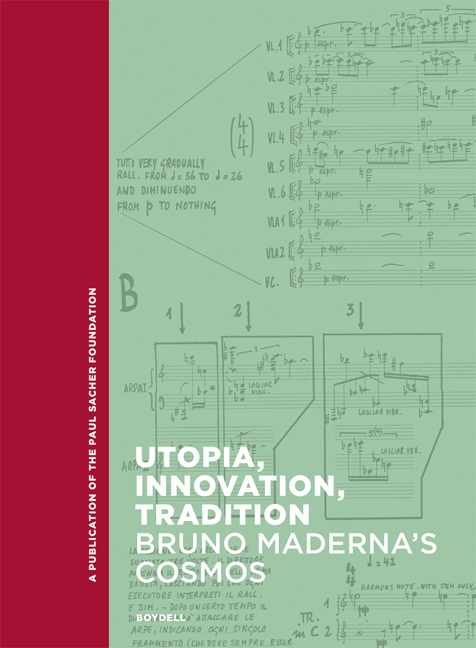Book contents
- Frontmatter
- Contents
- INTRODUCTION
- STAGING AND PERFORMING SOUNDS: A GLANCE THROUGH THE LAST THEATRICAL WORK
- BUILDING SOUNDS: THE COMPOSER
- CREATING SOUND: THE MUSIC BEYOND/WITHOUT THE STAGE
- REINVENTING SOUNDS: DIALOGUES WITH MUSIC OF EVERY EPOCH AND STYLE
- ACROSS BORDERS: THE CONDUCTOR AND THE INTERPRETER
- SEARCHING FOR ROOTS: THE DEVELOPMENT OF A STYLE
- STAGING AND PERFORMING TEXTS: A GLANCE THROUGH EARLY DRAMATURGICAL AND VOCAL WORKS
- Chronology Of Bruno Maderna’s Works
- Selected Bibliography
- Index
The Studi per “Il Processo” di Franz Kafka, and Their Stage Sources
Published online by Cambridge University Press: 17 January 2024
- Frontmatter
- Contents
- INTRODUCTION
- STAGING AND PERFORMING SOUNDS: A GLANCE THROUGH THE LAST THEATRICAL WORK
- BUILDING SOUNDS: THE COMPOSER
- CREATING SOUND: THE MUSIC BEYOND/WITHOUT THE STAGE
- REINVENTING SOUNDS: DIALOGUES WITH MUSIC OF EVERY EPOCH AND STYLE
- ACROSS BORDERS: THE CONDUCTOR AND THE INTERPRETER
- SEARCHING FOR ROOTS: THE DEVELOPMENT OF A STYLE
- STAGING AND PERFORMING TEXTS: A GLANCE THROUGH EARLY DRAMATURGICAL AND VOCAL WORKS
- Chronology Of Bruno Maderna’s Works
- Selected Bibliography
- Index
Summary
The Studi: the Chronology of their Genesis
The concert conducted by Hermann Scherchen on 13 September 1950 was the one fixed point among the dozens of variables and variations on the tortuous path to the finalization of the program for the “XIII Festival Internazionale di Musica Contemporanea della Biennale di Venezia,” and in particular for the symphonic-choral series.1 The event would have been remembered for having hosted the first Italian performance of A Survivor from Warsaw and, secondly, for the world premiere of Studi per “Il Processo” di Franz Kafka by the thirty-year-old Bruno Maderna, a work whose fortune would be more musicological (for its contribution to the development of serial techniques) than performative in nature. This is the program for the event:
Darius Milhaud, Suite for two pianos and orchestra, op. 300 Bruno Maderna, Studi per “Il Processo” di Kafka, for soprano, speaker, and orchestra2 Wladimir Vogel, Sette aspetti di una serie dodecafonica [Seven aspects of a dodecaphonic series], for orchestra Arnold Schoenberg, Il superstite di Varsavia [A Survivor from Warsaw], for speaker, male chorus, and orchestra Rome RAI Symphony Orchestra and the Teatro La Fenice Chorus
Several modifications had been made to the program in the previous months, except for the name of the conductor, Darius Milhaud (“the best and most insatiable devotee of dodecaphonics that exists in the world of modern music”),3 those of the two pianists Arthur Gold and Robert Fizdale, and that of Maderna. Even Arnold Schoenberg and his “Der Tanz um das goldene Kalb” from Moses und Aron first appears and is then deleted from the surviving draft copies; it seems that originally the composer himself had intended to present it. Documents relating to the Biennale, held at the end of March–April 1950, mention the Italian composer's Musiche su Kafka, but in the plans dated 14 May 1950 this has been replaced with the far vaguer Musica per orchestra:
Moreover, in January of the same year, Maderna had seen the possible performance of his new work by Milan's Orchestra dei Pomeriggi Musical go up in smoke. The group's founder and artistic director was Ferdinando Ballo, who also happened to be the organizer of the Biennale Festival.
- Type
- Chapter
- Information
- Utopia, Innovation, TraditionBruno Maderna's Cosmos, pp. 383 - 414Publisher: Boydell & BrewerPrint publication year: 2023



